|
Your weekly dose of scripture in 280 characters or less! Faith is about rejoicing in the possible. Religion and a joyous life are not opposites. Pslam 92:4 - For you, O Lord, have made me glad by your work; at the works of your hands I sing for joy. Beautiful afternoon at Tanglewood - August 29, 2018
0 Comments
Sermon Notes “May the words of my mouth and the meditation of our hearts be acceptable to you, O Lord, my rock and my redeemer.” (Ps 19:14) Can you imagine Jesus running away from something? From anything, anyone? This is the man who didn’t run away from the cross. Yet when the people of His day wanted to make Him their king, Jesus ran away. He ran off into the hills all by Himself. He ran away and hid. He even sent His disciples away by themselves. He’d catch up with them later by walking on the water. He could walk on the water, but He was afraid the crowds would drag Him to be their king. So Jesus ran away. If you remember me saying last Sunday, the church asked us to skip right over Mark’s story of the feeding of the 5,000. We read the verses right before and after it, but we skipped the miracle of the loaves. There were hints that something was brewing, but only hints in Mark. Today though, we hear that same story but from the perspective of John. And John doesn’t leave any doubt about what’s taking place among the people. What Mark implied between the lines, John says straight out. The feeding of so many from so little was a sign from heaven that Jesus was God’s Messiah. Jesus had done just what Moses had done in the desert during the Exodus. He fed God’s people miraculously. Surely, this was the leader long foretold. Those thousands of people were ready to take Jesus, by force if necessary, and anoint him king. So Jesus ran away. What was Jesus so afraid of? In one word: David. Jesus did not want to be David. David was the idealized king of Israel. David was the supposed model for the coming Messiah that the people were waiting for. When the kingdom came crashing to an end in 587 B.C., the people of Israel hoped and waited for it to return through the reemergence of another David. About 200 years later, they tried, but that failed almost immediately. So again, they hoped and waited. Another 300 years went past, and now the people were hearing stories about this Jesus the wonder-worker. Thousands of them were fed by a few loaves and fish. They began to see themselves as the Exodus people ready to fight their way into a new Promised Land. Now they thought for sure that Jesus was the one they had been hoping and waiting for, a king like David, who would lead them. So Jesus ran away. Jesus wanted nothing to do with being a king like David. Think about the opening words that Maureen shared with us in today’s first reading: “In the spring of the year, the time when kings go out to battle, David sent Joab with his officers and all Israel with him; they ravaged the Ammonites, and besieged Rabbah.” War wasn’t a necessity; war was a habit, a custom. War was as regular as Spring flowers. You could count on war just as surely as you could count on warmer weather. Just before the time of David, Israel didn’t have kings. They had Judges. A Judge would arise in times of crisis, like when an enemy threatened. Then, when the crisis passed, so did the rule of the Judge. But once Israel had a king, well, kings need armies, and armies need something to do, and well, war became a habit. So Jesus ran away. You know, there’s an awful lot of Jesus-talk thrown around in politics nowadays, but it disappears when it comes to war. The United States has the most powerful military in the world by far. The temptation is always there that if you have an army you use an army. Considering our Gospel story today, I wonder what Jesus’ advice for us would be? Then the story of David moves on to a story of rape. It’s not called rape in the Bible, but that’s what it is. David’s palace was located on the highest ridge of Jerusalem. The rest of the city lay below him. In days long before running water, David catches a glimpse of Bathsheba bathing on her own rooftop. It moves quickly from voyeurism, to rape. David sends his soldiers to grab Bathsheba and drag her to his palace. Then the king rapes this terrorized woman. In this long overdo time of the #MeToo era, maybe we should give a bit more consideration to Bathsheba’s point of view. Not a word is voiced in the Bible about it. This was just the way things were. How did she feel when David sent her back home after he had used her? Who could she ever tell this story to? Who would care? Who wouldn’t say that it was her fault for bathing? This is the story of David that the people there on the mountainside with Jesus knew and this is the king they wanted Jesus to be. So Jesus ran away. Bathsheba’s plight is not over. She becomes pregnant. You heard the story. David calls her husband back from the war hoping that he will lie with his wife and then the child could be explained away. But Uriah is an honourable man and does not allow himself the luxury of domesticated life while his brothers in arms are still fighting. So David has Uriah killed. David raped the wife and murdered her husband. Some people’s lives simply did not matter. Ohhh, the king’s did, but people like Bathsheba and Uriah, their lives were unimportant. I wonder what Jesus would have to say to us about something like this, that some lives matter and some just don’t. Again, this was the king that those who were fed by Jesus were waiting for. So Jesus ran away. The Massachusetts Conference Minister, Rev. Don Remick, recently quoted Einstein in one of his articles and it’s posted on our church’s FaceBook page. Quoting Einstein caught my eye immediately. It’s purported that Einstein once said: “No problem can be solved from the same level of consciousness that created it.” Einstein had to rethink everything to figure out the universe.
He had to start from square one. He had to question all of the old assumptions that had been accepted by everyone for hundreds of years, and then he needed to create new ones that better answered the questions. Einstein is synonymous with genius because he realized that “No problem can be solved from the same level of consciousness that created it.” Jesus ran away because He came into the world to solve the problems that persist and repeat themselves generation after generation, world power after world power, of hatred and violence, of prejudice and selfishness, of greed and self-righteousness. Jesus came into the world to show us another way to live and also to lead – a radically new way. And to do so, Jesus had to move well beyond the expectations of His very own people. They wanted Jesus to be their king like David, and they were ready to do so by force if necessary. Jesus wanted nothing to do with this example of war and the abuses of power and of people. So Jesus ran away. And when He ran away from this thousand years of expectation, Jesus gave us a warning, a warning still in effect today, a warning still in the Bible’s voice to us and for us today. Don’t be surprised when Jesus surprises. Don’t imagine that the will and way of Christ has to be the same as ours. Ours has to be the same as His. Maybe religion and the religious need to be more prophetic. Maybe we need to rock the boat so that we don’t get too comfortable and think that the way things are, are just fine with Jesus. Maybe we need to look at the society we’re building and then compare this with Jesus’ gospel. If there’s a disconnect between the two, we can throw around all of the Jesus-talk we want, but still Jesus will run away. Maybe we need to speak out so that Jesus’ message can be heard loud and clear above the message of all the world’s Davids. May Jesus guide us as church and as Christian so that He never has to run away from us. In His name we pray. Amen. Your weekly dose of scripture in 280 characters or less! God is seen in all of creation.Paul's Epistle to the Romans 1:20 - Ever since the creation of the world his eternal power and divine nature, invisible though they are, have been understood and seen through the things he has made.
Now let me return to the proposition of Jesus’ radical equality, especially in the case of women. A crowd gathers around Jesus’ house in Capernaum and Jesus refers to all of them, the men and the women, as His family: “‘Whoever does the will of God is my brother and sister and mother.’” That “whoever” is important. Jesus is talking to men and women, thus the male and female references, and when talking to both women and men He says intentionally “whoever.” Gender differences don’t make a difference to Jesus. Some may hear in these words the message that the “will of God” means one thing for men and another for women. This is called “complementarianism” — or the belief that men and women have distinct, or complementary, roles at home and in church, and that these should not be confused. Jesus, however, had no qualms with women providing for Him and His ministry (Luke 8:1-3) so I’m not too confident that Jesus would subscribe to complementarianism. This gender blindness is testified to further by His visit with Martha and Mary. Martha performs dutifully the “woman’s work” of preparing the meal. Mary has the audacity to sit at the teacher’s feet to listen and learn - with the men, like a man. When Martha tries to remind Jesus of this impropriety, Jesus distances Himself from such distinctions and says, “‘Martha, Martha, you are worried and distracted by many things; there is need of only one thing. Mary has chosen the better part, which will not be taken away from her.’” (Luke 10:41-42). Woman or not, Jesus didn’t care. He saw someone who yearned for God. He didn’t see a woman. He saw “whoever.” The “whoever” attitude of Jesus is screaming-loud in John’s story of the Samaritan woman at the well. The disciples go off to find food leaving Jesus by Jacob’s well. The Samaritan woman shows up and Jesus asks for a drink. She is immediately surprised that a Jewish man would talk with her, a Samaritan woman. A lot takes place in the story, but I wish to jump to its conclusion. When the disciples return, after much talk about Jews and Samaritans has intervened, they don’t stammer a stunned question about the fact that Jesus is talking with a Samaritan. They are much more befuddled by the scandal of Jesus talking with a woman (cf. John 4:27). The disciples have taken on the role of Martha, but Jesus is still Jesus. He’s still preaching the “whoever” message. Jesus’ teaching on divorce is based on this radical equality. In that day, in the Jewish tradition, a man could divorce his wife easily and for no reason. A wife could not divorce her husband no matter what. Jesus is asked about divorce by people who want to trap Him because under Roman law a wife could end a marriage. They’re testing Jesus. They’re figuring that however He answers, they’ll have Him. But in the oldest Gospel tradition, Jesus doesn’t allow for divorce at all. He speaks of the ideal of marriage where the two become one. This means that the husband can’t simply write off his wife for some real or imagined infraction or if he just gets bored with her. Jesus treats the wife as a person not as a piece of property. And then on top of this, Jesus holds the wife to same moral standards as the husband. Roman law would allow for her to divorce a husband, but Jesus holds the wife to the exact same standards as the husband. They both must work at the marriage ideal - equally. About ten years later, Matthew retells this story and surprisingly (not really) he leaves out the passage about the wife having the possibility of divorcing her husband (because Matthew is writing for a Jewish-Christian community where such a possibility is not even considered). Then Matthew creates a proviso that the husband can divorce his wife for infidelity; the old ways are slipping back in. The church, right in the canonical text, is already interpreting the written words of Jesus. This is necessary, but we need to remember that the oldest tradition was Jesus’ insistence of complete equality before God and this should be honoured and carried forward if the interpretation is to remain faithful to the original. And let me share one more story. Part of the story is the story. John 7:53 - 8:11 probably wasn’t a part of the original John. It probably was written after what is now Luke 21:38. We were just talking about interpreting the text right in the canonical text. Well, it may be that a Lucan editor was not too pleased with this story of the woman caught in adultery and forgiven so he excised the passage. John is a good ten years after Luke and the period is closing when eye witnesses to Jesus’ life are available. The window is closing on the biblical period. Rather than let this pericope disappear from the tradition, the editor of John works it into his Gospel. It seems that the story was unnerving in its equality. As far as I know, it takes two to commit adultery. The woman was said to be caught in the act. The men filled with righteous indignation haul this sinful woman into the Temple courtyard to dispense the religious justice of the mob just like has happened throughout history and still today. The most vulnerable are always the victims. The powerful escape. The religious mob asks Jesus for His opinion. They should be more careful. Jesus calmly bends down and begins writing on the ground. We know not what. But I wonder if it had anything to do with Leviticus 20:10, which reads: “If a man commits adultery with the wife of his neighbour, both the adulterer and the adulteress shall be put to death.” The ones dragging the woman to judgment, they knew this law, but they didn’t really want to punish the man, they only wanted to kill the woman. Jesus would have none of this blood lust, this sexist savagery. He would not allow these men cloaked in religion to cover their offense with God-talk. Jesus would have none of it. The mob slowly disperses and Jesus talks with the adulterous woman as a person and moves her closer to God. These are the reasons why I find it so hard to accept that churches continue to relegate figuratively women to the back pew in the name of this Jesus. You can see the more traditional worldly standards creep into the Christian text as the church grows older and strives to fit in more conventionally in the patriarchal society around it. In the authentic Pauline Epistle to the Galatians, for example, Paul writes: “There is no longer Jew or Greek, there is no longer slave or free, there is no longer male and female; for all of you are one in Christ Jesus.” (3:28) In a later letter that is not considered to be among the seven authentic Pauline Epistles, the gender equality is stricken from a similar text: “In the renewal there is no longer Greek and Jew, circumcised and uncircumcised, barbarian, Scythian, slave and free; but Christ is all and in all.” (Colossians 3:11) Where did the “no longer male and female” disappear to? The church gave in to the world around it and then in a weird turn of events the ones who so often call the ways of the world corrupt hang on to these changes and force them upon the church. This tendency only becomes more pronounced in the definitely deutero-Pauline Pastoral Epistles to Timothy and Titus that complementarians love to quote. But when Paul stands up for Jesus with this radical equality and then someone usurping Paul’s name writes against it, I have to stick with Paul.
Much earlier I mentioned how religion as an institution has played a huge part in this separation between the message of Jesus and the earliest church and the message of Christianity. Religion as an institution has a built-in preservation mode. That’s the “traditionalism” we spoke about in the May 28th post. Women have not fared well in much of religious history, and even Jesus is having a hard time correcting this “traditionalism.” It’s not easy or even natural for a self-preserving institution to express the constant vibrancy of Jesus and the earliest church. Thomas Aquinas, and I’m indebted to an article by Peter Harrison for this information, discusses “religion” (religio in Latin) in his Summa Theologiae not as a systematic set of beliefs and practices, as we tend to do today, but as a moral virtue. In its primary sense, religio refers to interior acts of devotion and prayer, and these interior aspects of religio are more important than any outward expression of religio. Even the outward expressions of “religion” are defined in the Epistle of James as acts of compassion rather than of worship (1:27). But somehow religion has moved from personal qualities and compassion to a strict system of beliefs and practices. The personal qualities of religion are orientated toward progress toward a goal. Religion as a system prefers the static. The UCC recognizes this conundrum and has proudly re-proclaimed consistently and institutionally words of one of her earliest leaders. John Robinson was the pastor to the Pilgrims. In his farewell remarks to them as they embarked for the New World, he promised, “The Lord hath more light and truth yet to break forth from his holy Word.” This is the basis for our current theology of “God is still speaking,”. We are supposed to be constantly prepared to be surprised by Jesus. In a world where religions still act as a bulwark of sexism, the UCC is trying to follow Jesus’ genuine equality of “whoever” so that sermons about a girl’s appearance, or preaching that a wife needs to endure an abusive marriage, or that woman must be submissive, or that rapists should be forgiven so that the institution isn’t embarrassed, that such nonsense as this is not allowed to continue, that instead the Jesus of “whoever” may lead us forward. Rev. Randy A certain little girl, when asked her name, would reply, "I'm Mr. Sugarbrown's daughter." Her mother told her this was wrong, she must say, "I'm Jane Sugarbrown." The Vicar spoke to her in Sunday School, and said, "Aren't you Mr. Sugarbrown's daughter?" She replied, "I thought I was, but mother says I'm not." I laughed out loud when a friend shared this joke with me online. For as funny as it is, however, there’s also a message buried in it that I would like to explore a little, and yes, this does suck all the fun out of a funny joke. Sorry. The mother is trying to help her daughter define herself, but the church thinks of her as identified by the male in her life. It is hard for me to understand how Jesus’ relationship with women led to Christianity’s relationship with women. I think it has a lot to do with “religion” as institution, but I’ll talk about that in a bit. Somehow the radical equality of Jesus and the earliest church got turned around and Christianity joined the religion-parade that hallowed the idea of women’s inequality. One of the reasons that I am so happy to belong to the UCC is that this is a church that has stood up for Jesus’ radical equality even before it was mainstream. The central offices of the Massachusetts Conference are located at Edwards House in Framingham. My wife Sharon and I attended recently a clergy tax conference there. Sharon is the practical minded one in our relationship. She’s the one who stayed through all of the session. I wandered. There are various meeting rooms in Edwards House and they’re named after religious pioneers. Please check out the link to read about the various rooms: https://www.edwardshouseframingham.org/meetingrooms I hope you noticed that the Brown Room is named after the first woman Ordained in the United States. It took place in 1853 in a Congregational Church! Rosie the Riveter wouldn’t appear for another nine decades. The Women’s Rights movement would be three more decades after that, and the #MeToo movement is our current history. 1853! That’s something to be proud of. As opposed to … This Spring the Southern Baptist Church had to slowly (begrudgingly?) fire their President, Paige Patterson, as the leader of the denomination. As the head of a seminary, he had advised a young woman who came to him with an accusation of rape against another seminary student. In words not unlike that of the Roman Catholic bishops during the clergy sex abuse scandal, he told her to not press charges for the sake of the good name of the church and that she should forgive her attacker. In a similar episode in 2015, he arranged to meet alone with another woman who was making accusations of rape. He did so in order to “break her down.” Patterson made front-page news recently after taped comments were aired in which he advises from the pulpit that an abused wife should pray to be “submissive in every way that you can” because divorce would be the true sin. This religious leader also preached a sermon that included a comment “on a teenage girl’s body and told his female seminary students to pay more attention to their physical appearances.” (Washington Post, 6/2/18) With this sort of religious thinking about women still coursing through religious institutions today, and with limits placed on how women may serve Christ in so many denominations because they are women and not men, it only makes that 1853 Ordination that much more amazing. And as you can see from the other named rooms at Edwards House that tradition of being trend-setters continues in the UCC.
Mark 8:22-38 Part TwoIt took only a moment for the traditional expectations of the Messiah to overpower everything that Jesus had hoped to teach and exemplify. Immediately after Peter’s profession of “‘You are the Messiah,’” as noted in Part One, Jesus switches to “Son of Man” language, but even this more pedestrian terminology cannot undo the bravado expectations of these men following Jesus. When Jesus offers His first execution prophecy, they are not only confused. They are offended. The Messiah will be recognized by the accompanying mighty works of God, not by the defeat of execution. Peter even dares to pull Jesus aside and “rebuke” Him. Peter’s profession of Jesus’ Messiahship seems to have been offered as the judgment of all the disciples (Jesus ordered “them” not to say anything), but Peter’s rebuke of Jesus is his alone: “But turning and looking at his disciples, [Jesus] rebuked Peter …” I pause in repeating the remainder of this biblical quotation to emphasize what was obviously intended to be emphasized. Nowhere else in the Gospels does Jesus so forcefully reprimand another person. When Peter confuses the traditional expectation of the Messiah with Jesus’ revelation of the Messiah, the Christ, and when Peter then tries to impose this upon the Messiah, the Christ, Jesus’ words are never harsher: “‘Get behind me Satan! For you are setting your mind not on divine things but on human things.’” Remember the miracle of Jesus’ two-part cure of the blind man? At first, he could only see partially. This must symbolize the spiritual vision of those like Peter who could only see according to their own expectations (“human things”), which blinded them to God’s revelation (“divine things”). Peter, thinking more of his expectations than of Jesus’ example and teaching, is equated with: “‘I can see people, but they look like trees walking.’” A crucified Saviour, a crucified God in the famous coin of phrase of Jurgen Moltmann, is Christianity’s eye exam. When we can see the sacred importance of our crucified God, then this is equated with the fulfillment of the miracle and “his sight was restored.” But Jesus is not yet done. The Messiahship discussion was between Jesus and His disciples alone. Jesus knew the dangers of this topic and it was limited to His closest followers. With the discussion broached and then quickly put back away for another time (And at another time, we can discuss that Jesus next admits to His Messiahship during His hearing before the Sanhedrin when He is asked directly if He is the Messiah, and He answers unequivocally, “‘I am.’”), Jesus then calls together “the crowd with his disciples.” What Jesus is about to say is meant for everyone who would choose to be among His followers. The revelation of Jesus’ execution startled the disciples. For as radical as it was, Jesus takes it further and we can only imagine what it must have been like when Jesus then drops the next bombshell. Not only does Jesus reveal a crucified God, He warns: “‘If any want to become my followers, let them deny themselves and take up their cross and follow me.’” Only if the disciples and the people in the crowd are willing to accept this revelation of self-sacrifice as faithfulness and virtue, can they then equate themselves with the blind man when “he saw everything clearly.”
Mark’s inspiration is to let each generation of believers face this test of faith. Can we accept a suffering servant of a Messiah rather than a conquering hero of a Messiah? Can we go to the cross with Jesus and see it as His final testimony of true Messiahship? And can we then live our faith accordingly? There are no resurrection appearances in Mark’s Gospel. The question is, therefore, timeless. So, I guess the question is, do we “see people, but they look like trees walking” or do we see “everything clearly.” These are the questions that Bible study encourages. Too often the Bible is cut up and dissected into such little fragments that it can say just about anything we want it to say. The Bible needs to read in a fuller context than this. We need to read, study and pray over the passages as part of a larger whole. This is why I always invite you to come and join us for Bible study. Our next meeting can be found by going to our current monthly newsletter and checking the calendar of events. MARK 8:22-38 PART ONEIn Mark 7, Jesus cures a deaf man by placing His fingers in the man’s ears and His spittle on the man’s tongue. Not the prettiest picture to imagine. Maybe this is the reason why the later Evangelists choose not to retell the story, but Mark has no such aversion. As a matter of fact, at 8:22 Mark begins to tell another such story. This time the man is blind. Again, Jesus touches the man and this time Jesus puts His saliva on the man’s eyes. This time, however, something unexpected occurs. The miracle is not immediately effective. The blind man recovers his sight, but only partially: “‘I can see people, but they look like trees walking.’” Well, this never happens with Jesus-miracles. Jesus tries again. He lays His hands upon the man. This time the miracle is complete; the man sees “everything clearly.” The strangeness of this miracle story should suggest to us that something else is taking place in tandem with the miracle. The only somewhat successful miracle should grab our attention and ask us to think a bit more about the purpose of this story. Many scholars see this as the fulcrum of the Gospel. The balance of the story is about to shift. And does it ever. The Caesarea Philippi declaration at 8:29 was an historically and theologically significant event in the life and ministry of Jesus of Nazareth, and of His followers. It changes the direction of Mark’s Gospel. The symbolism is intentional that Jesus and the disciples are “on the way” when Jesus asks, “‘Who do people say that I am?’” This question and answer are a work in progress. This developmental quality is reflected in the disciples’ various answers. Then I hear Jesus ask in a sullen and uncertain voice, “‘But who do you say that I am?’” He has come to realize that His ministry will culminate in a violent reaction to His person. Jesus searches His closest followers hoping that they at least have an awareness of who He is. Peter answers with words of great insight: “‘You are the Messiah [, the Christ].’” This may be Peter acting as spokesman for the group since Jesus answers quickly with a command to all of them: “He sternly ordered them …”
Now that the Messiahship has been broached, Jesus quickly retreats to “Son of Man” language. Messiah was a heavy-laden word in Jesus’ day and one that Jesus did not wish His followers to become distracted by, but Jesus still needed to hear it said. With this bit of reassurance rendered, Jesus chooses immediately to refer to Himself as Son of Man, a self-identification as one among the rest of us. But the effects of Messiah are not that easily forgotten. <To be continued> |
NewsFaith, love and chitchat. Categories
All
Archives
June 2024
Follow
|
||||||
|
SERVICE TIMES
Sunday 9:30-10:30am Children Sunday School 9:30-10:30am Nursery care available during worship DONATE Make a single or recurring contribution by clicking here |
FOLLOW
|

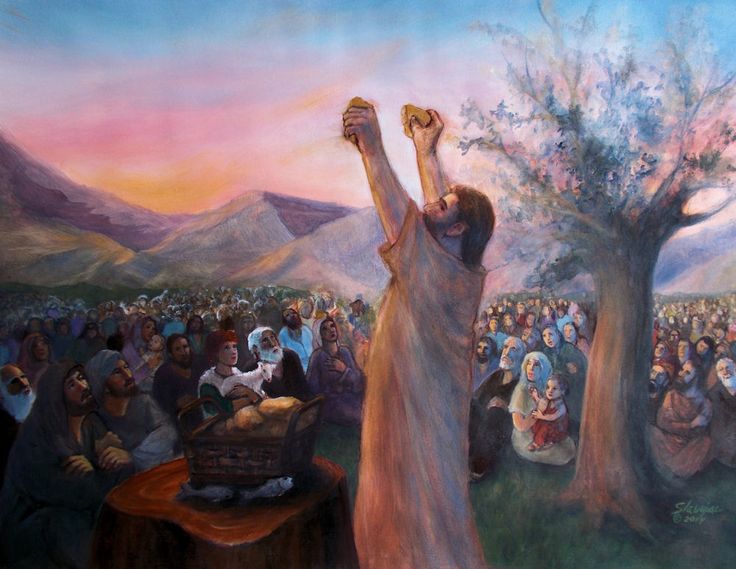







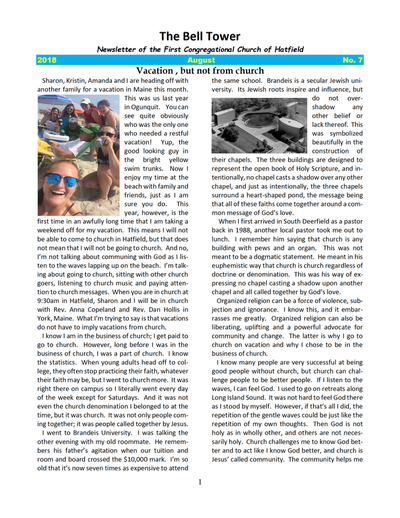

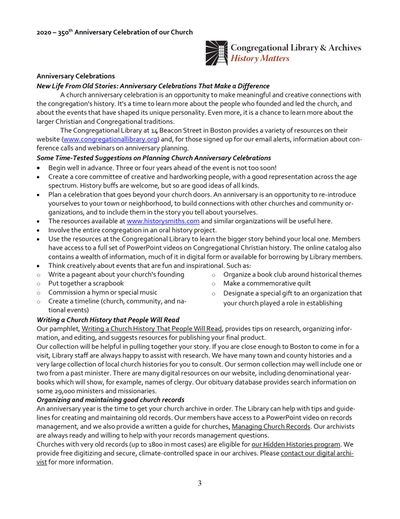
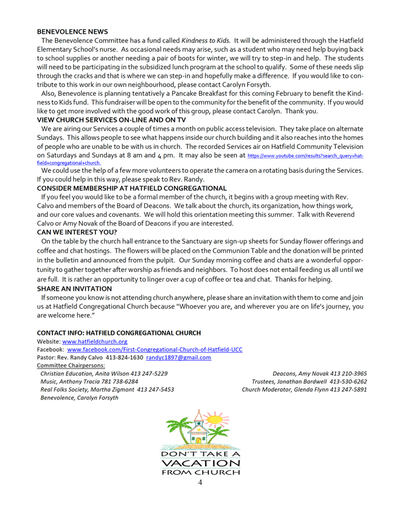

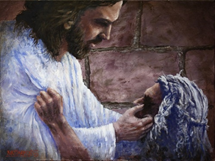


 RSS Feed
RSS Feed
